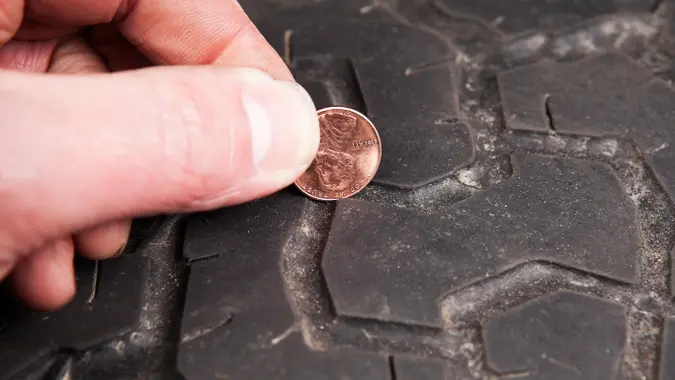4 Financial Moves Rich People Will Make in 2015

Commitment to Our Readers
GOBankingRates' editorial team is committed to bringing you unbiased reviews and information. We use data-driven methodologies to evaluate financial products and services - our reviews and ratings are not influenced by advertisers. You can read more about our editorial guidelines and our products and services review methodology.

20 Years
Helping You Live Richer

Reviewed
by Experts

Trusted by
Millions of Readers

This post was originally contributed by Cathie Ericson on LearnVest.
It’s hard to believe that the rich don’t have some secret knowledge about money that the rest of us “regular” people don’t have.
After all, the more zeros you have at the end of your paycheck, the smarter you must be about managing your finances, right?
Truth is, there’s no silver bullet that the wealthy possess.
Whether you live in a sprawling country estate or a modest bungalow home, the fundamentals of smart money management probably don’t look all that different: sticking to a budget. Living within your means. Saving for a rainy day.
Still, it doesn’t hurt to take a peek at the finances of the well-to-do every once in a while to see what wisdom we can glean from their money moves.
So we tapped four wealth advisers who work with high-net-worth individuals to suss out what plans their clients have for their money in the coming year — to see what money lessons from the rich we may be able to adopt in 2015.
Related: How to Be Rich in 6 Simple Steps
The Rich and Investing: They’re Eagle-Eyed About Economic and Market Trends
To say that 2014 was an unpredictable year for the economy may be putting it lightly.
The Dow Jones Industrial Average and the S&P 500 indexes broke multiple records. Pundits spent a lot of time trying to guess when the Fed would raise rates. And countries in Europe and Asia were confronted with rocky economies.
The trickle-down effect for wealthy investors? They now want to learn as much as they can about market and economic trends before deciding how to invest their money — and that’s even if their portfolios are managed by others.
“My clients are increasingly paying attention to the technical aspects of mutual funds — like researching the philosophy of the fund manager before they invest,” says Tony Drake, CFP® and founder of Drake & Associates, LLC.
For instance, a fund manager may view emerging markets as the next big thing, and weight the assets that he manages in that direction. But, depending on what an investor’s goals are for her money, she may believe more deeply in the strength of the U.S. economy, and prefer more local investments.
“[Wealthy clients will] look for something that more closely aligns with their beliefs,” adds Drake. “They depend on their adviser’s judgment, but they also want to be involved in the investments they make.”
Related: Money Secrets of the World’s Richest People … Revealed
How to Take a Cue From the Well-to-Do: High-net-worth clients of investment firms that boast an army of analysts likely have a plethora of white-glove research and white papers at their disposal to help them understand what’s going on in the markets.
But you don’t need a seven-figure investment account to be able to mine financial insights. If you’re willing to put in the time, you can find a lot of great information on free sites like Investopedia.com or Yahoo! Finance, according to Drake.
Other reputable blogs, like The New York Times’ The Upshot and The Wall Street Journal’s Real Time Economics, can also help you make sense of how bigger trends may affect you on a smaller scale.
One of the keys, however, is to make sure you’re not investing based solely on your emotions, says Drake. Giving too much sway to alarmist headlines or talking heads could result in decisions made on the fly that may not jibe with your goals. Instead, seek out information that really delves into market trends over the long term.
“What [many individual investors do is] chase past returns,” Drake says. “Higher-net-worth investors tend not to let emotions drive their decisions, rather basing them more on the technical analysis.”
Video: Make Money By Thinking Like the Rich Do — And Buying Starbucks
The Rich and Retirement: They’re Stress-Testing Savings
One of the best financial feelings is knowing that you’re on track for the retirement you want. Even more reassuring? Knowing that you’re prepared for what may happen if things don’t go exactly the way you expect with your nest egg.
“In retirement, your savings becomes your paycheck, so my wealthy clients are interested in ‘pre-experiencing’ their financial situation,” says Elle Kaplan, C.E.O. and founder of LexION Capital.
This may be a reflection of the fact that making a nest egg last remains a top concern — even among the rich. In a recent Morgan Stanley poll, 71% of high-net-worth couples said they routinely discuss whether they’ll have enough money to sustain their lifestyle in retirement.
That’s precisely why Kaplan’s team develops forecasting analysis for clients that depict potential outcomes for their retirement investments — in both good and bad markets. “This helps us build a plan for any eventuality, so they can meet or exceed [their retirement goals],” she says.
How to Take a Cue From the Well-to-Do: Even without an arsenal of number-crunchers at the ready, it’s still important to know if you’ll be able to maintain your desired quality-of-life in retirement — and that you’re prepared for both the best- and worst-case scenario.
“The biggest mistake I often see people make with retirement is lack of planning,” says Drake, adding that this can range from not budgeting for it properly to not investing in a way that matches their goals and risk tolerance. “They may only need a 5% rate of return [to meet their needs], but they’re invested as if they’re looking for a 14% return.”
One rule of thumb is to try to replace 85% of your income in retirement, although you still need to determine if you’re on track to get there and how much of a cushion — if any — you’re creating for yourself.
Try using a retirement calculator like this one to see how your outcome changes as you manipulate certain factors, such as your annual contributions, the annual rates of return and your desired retirement age.
Could you still live comfortably if you ended up with a lower rate of return over time? How much of a shortfall would you be comfortable with? Would you rather make that up through increased contributions now, or cutting back on future expenses?
The answers to these questions can help give you a reality check with respect to your retirement savings — and alert you to any potential bumps in the road.
“Most people are in a situation where they are able to change potential outcomes with adjustments to expenses or contributions — if they analyze these scenarios today,” Drake says. “The unfortunate reality is that some folks wait until it’s too late.”
Related: The Millionaire Mindset: 6 Mistakes the Rich Never Make
The Rich and Estate Planning: They’re Making It Easier to Pass Along Assets
One of the benefits of not being a millionaire? You probably don’t need a legion of estate attorneys constantly managing your web of assets.
But just because the rich can afford pricey professional help doesn’t mean they aren’t interested in finding ways to make estate planning cheaper and easier — especially if it means avoiding probate court, messy family feuds and navigating ever-changing estate laws.
After all, this is partly why the wealthy get an estate plan in the first place: to minimize the administrative burden associated with settling their assets. In a recent U.S. Trust report of high-net-worth individuals, respondents cited this as the third-most-important reason to have an estate plan — after ensuring a spouse’s financial needs and minimizing estate taxes.
One fairly simple piece of advice that Fred Creutzer, president of Creutzer Financial Services, recommends to his wealthy clients — even those who’ve set up trusts — is to designate Transfer on Death (TOD) beneficiaries for investment accounts, and Payable on Death (POD) beneficiaries for bank accounts and certificates of deposits.
That’s because these beneficiaries will inherit the money or assets directly after the account holder’s death — bypassing the often lengthy and expensive probate process, which can drain an estate’s assets.
“While these directives shield the money from the eventual heirs while the account owner is alive, my clients want to ensure that their kids have access to the money right away upon their death,” Creutzer says, adding that he’s always surprised at how few people realize that these designations exist.
How to Take a Cue From the Well-to-Do: The good news, says Creutzer, is that naming TOD and POD beneficiaries has nothing to do with how many assets you hold or how much money you keep in the bank.
And the process is as simple as filling out the forms required by your bank or brokerage house — not to mention that it’s free.
“Anyone can add these to an account,” he says. “Trusts also avoid probate, but you can use [TOD and POD designations] to avoid having to pay for a trust.”
Your beneficiary designations, by the way, legally trump whatever is written up in your will. So if your will states that you want a sibling to receive the money in your checking, but your POD payee is an ex-spouse, your ex will receive that money instead — so it’s a good idea to make sure your designations are kept up-to-date.
Related: #richkidsofinstagram vs. Millennials: How Do Their Budgets Compare?
The Rich and Charity: They’re Gifting in a Tax-Smart Way
Being charitable with your money isn’t a perk just reserved for the wealthy.
That said, the well-off do seem to be embracing the spirit of giving a lot more these days: In 2014, high-net-worth households ramped up total giving by 28%, and 85% said they plan to give as much or more in the next three to five years, according to a U.S. Trust philanthropic study.
And because the rich can add a few more zeros to their checks, they can take advantage of some tax-efficient ways to give that may not be as accessible to those of us without as hefty a sum to donate. (In fact, about a third of the study’s respondents cited tax advantages as a chief motivation for giving.)
One such giving vehicle popular with the high-net-worth crowd is the charitable remainder trust (CRT), says Annalee Leonard, founder of Mainstay Financial Group. These are trusts to which a donor can gift assets, such as property or stocks, and the designated trustee is a charity of choice—say, a private foundation or alma mater.
The charity then continues to manage or reinvest the assets on the donor’s behalf, and pays a portion of that income for a specified period of time or until the donor dies. After that, the charity receives what’s left in the trust.
Aside from getting money back, the donor also reaps an income-tax deduction for the value of the gift — plus, the donor isn’t subject to capital gains or estate taxes, since the assets are no longer owned by the individual but rather the trust.
How to Take a Cue From the Well-to-Do: You probably don’t have enough spare property or stock lying around to fund a CRT, but that doesn’t mean you can’t gift money while keeping tax benefits in mind.
Another giving vehicle that may be more accessible for people who have at least a few thousand dollars to give is a donor-advised fund, or DAF, which allows you to give money or stock to a charity that holds it in an account where it grows tax-free.
You can decide later, with the help of the DAF advisers, which types of grants you want to give the money to — but you receive a tax deduction in the year you put your donation into the account, even if the funds aren’t distributed right away.
According to the National Philanthropic Trust, DAFs have seen their growth outpace other philanthropic vehicles, with total assets jumping nearly 20% between 2012 and 2013, compared with the single-digit growth of CRTs and private foundations.
Then, of course, there’s always the old-fashioned way to give: Simply donate money or goods to the nonprofit of your choice and write off the value of your charitable contributions on your taxes, assuming you choose to itemize your deductions.
But if you’re looking to, say, donate to your favorite alma mater and help out your favorite niece who’ll be continuing the legacy, you can cut a check directly to the school to go toward her tuition, suggests Leonard. “The money would still count as a gift, even though it’s for tuition, so it doesn’t affect the financial aid,” she adds.
The reason why cutting a check directly to the school — rather than to your niece — might be a better choice in this scenario is because gifts meant to cover tuition don’t count toward the IRS’s annual gift-tax exclusion. But if you’d cut the check directly to her, anything you gave above $14,000 could potentially be subject to a gift tax.
What all this shows is that, no matter the size of your gift, nest egg or bank balance, there are a number of possible ways to take a cue from the strategies of the wealthy. It’s just a matter of thinking like the rich, even if you’re not.
LearnVest Planning Services is a registered investment adviser and subsidiary of LearnVest, Inc., that provides financial plans for its clients. Information shown is for illustrative purposes only and is not intended as investment, legal or tax planning advice. Please consult a financial adviser, attorney or tax specialist for advice specific to your financial situation. Unless specifically identified as such, the people interviewed or quoted in this piece are neither clients, employees nor affiliates of LearnVest Planning Services, and the views expressed are their own. LearnVest Planning Services and any third parties listed, linked to or otherwise appearing in this message are separate and unaffiliated and are not responsible for each other’s products, services or policies.
Photo credit: Jaguar MENA
 Written by
Written by 

























